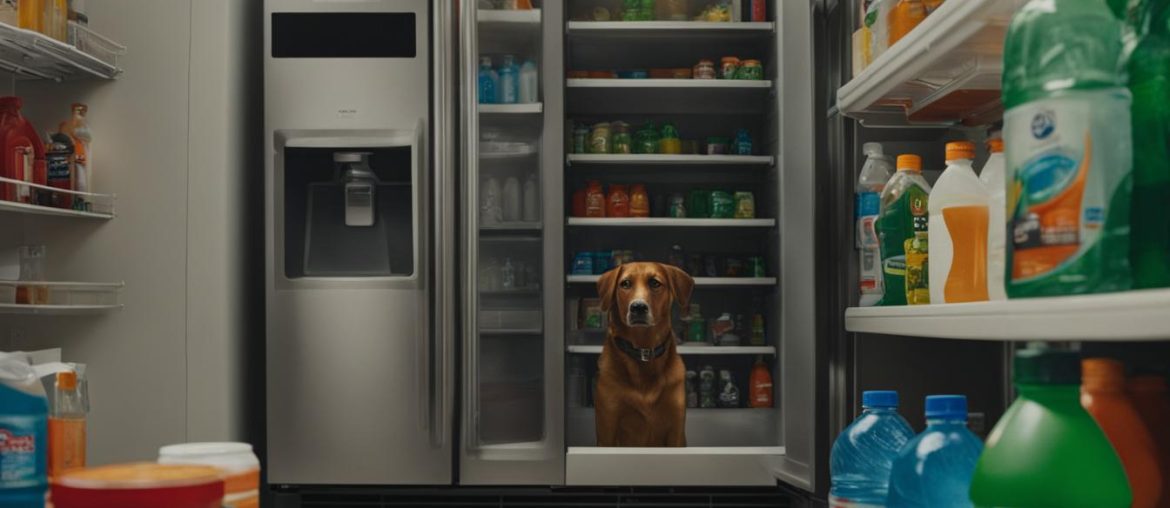Can dogs safely consume Gatorade? This article aims to provide pet owners with the truth about whether giving Gatorade to dogs is a good idea. Understanding the importance of proper hydration and maintaining the electrolyte balance in dogs is crucial for their overall well-being. Let’s explore the facts and considerations surrounding this popular sports drink for humans and its suitability for canine consumption.
Key Takeaways:
- Proper hydration is vital for a dog’s overall health and well-being.
- Gatorade contains ingredients that may not be suitable for dogs.
- The high sugar and sodium content in Gatorade can disrupt a dog’s electrolyte balance.
- There are safe alternatives to Gatorade that can provide proper hydration for dogs.
- Consulting with a veterinarian is recommended to determine the most suitable hydration options for dogs.
The Importance of Hydration for Dogs
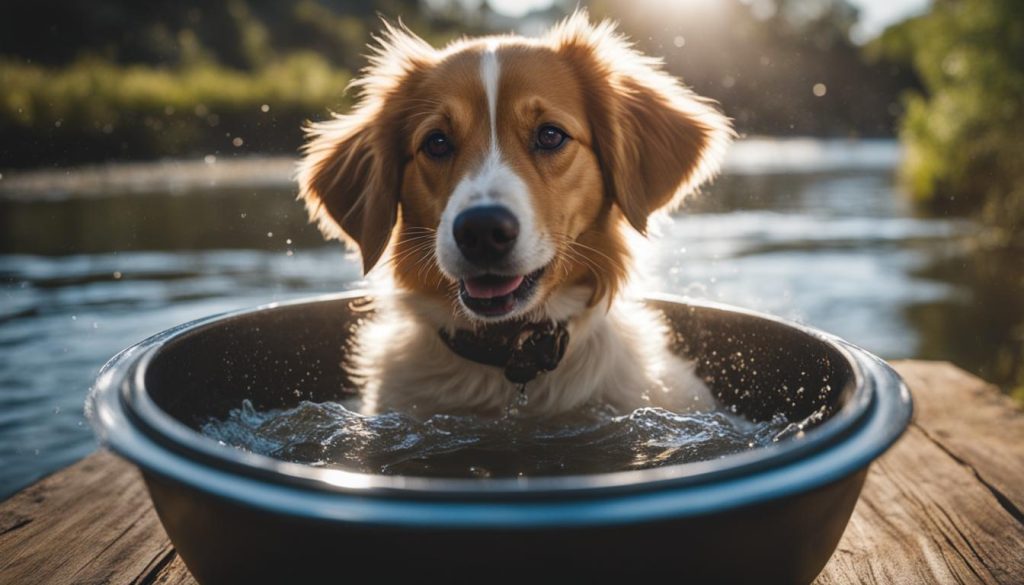
Proper hydration is essential for dogs to maintain their overall health and well-being. Just like humans, dogs rely on water to regulate their body temperature, aid digestion, and support various cellular functions. Without adequate hydration, dogs can experience dehydration, which can lead to serious health issues, including organ failure.
Dogs have unique hydration needs that depend on factors such as their size, breed, age, activity level, and environmental conditions. It’s important for pet owners to understand these needs and provide a sufficient supply of clean and fresh water for their furry companions. Monitoring your dog’s water intake and ensuring they are drinking enough is crucial to preventing dehydration.
In addition to water, there are other ways to help keep your dog hydrated. You can incorporate moisture-rich foods into their diet, such as wet dog food or adding water to dry kibble. Another option is to offer your dog ice cubes made from low-sodium broth or dog-friendly fruits like watermelon. However, it’s important to avoid providing beverages like Gatorade, as they can contain harmful ingredients that are not suitable for canine consumption.
The Importance of Electrolyte Balance
Electrolytes are minerals that play a vital role in maintaining proper hydration and bodily functions. They help regulate fluid balance, nerve function, and muscle contractions. When dogs become dehydrated, they lose electrolytes through urine and sweat. Replenishing these electrolytes is crucial to restoring and maintaining their health.
While Gatorade is marketed as an electrolyte-replenishing drink for humans, it may not be suitable for dogs. Gatorade often contains high levels of sodium and artificial additives that can disrupt a dog’s electrolyte balance and lead to further dehydration. It’s best to consult with a veterinarian for safe and appropriate alternatives to ensure your dog’s hydration and electrolyte needs are met.
| Signs of Dehydration in Dogs | Hydration Tips for Dogs |
|---|---|
|
|
Understanding Gatorade and its Ingredients
Gatorade is a widely recognized sports drink that is marketed to replenish electrolytes lost during physical activity or dehydration. While it may be beneficial for humans, pet owners should exercise caution when considering giving Gatorade to dogs. The ingredients in Gatorade may not be suitable for canine consumption and can potentially have harmful effects on their health.
When examining the ingredients of Gatorade, it becomes apparent why it may not be safe for dogs. Gatorade typically contains artificial additives, sweeteners, and high levels of sodium. These components can be detrimental to a dog’s health, potentially causing digestive upset, obesity, and even diabetes. Additionally, the excess sodium in Gatorade can disrupt the electrolyte balance in dogs and lead to dehydration, which is especially concerning considering that Gatorade is marketed as a hydration solution.
“While Gatorade is safe for human consumption in moderation, it poses potential risks when given to dogs.”
Pet owners must be aware of the potential risks associated with giving Gatorade to dogs. While it may be tempting to offer the drink to your canine companion during hot summer months or after intense physical activity, it is crucial to prioritize their safety and opt for alternatives that are specifically formulated for canine hydration. Understanding the ingredients and their potential effects on dogs can help pet owners make informed decisions regarding their pet’s health and well-being.
| Gatorade Ingredients | Potential Harmful Effects |
|---|---|
| Artificial additives | Can cause digestive upset |
| Sweeteners | Can contribute to obesity and diabetes |
| High levels of sodium | Can disrupt electrolyte balance and lead to dehydration |
Potential Risks of Giving Gatorade to Dogs
While Gatorade is safe for human consumption in moderation, it poses potential risks when given to dogs. The high sugar content and artificial additives in Gatorade can have harmful effects on canine health. Excessive consumption of Gatorade can lead to digestive upset, obesity, and even diabetes in dogs. Additionally, the high sodium levels in Gatorade can disrupt the electrolyte balance in dogs and contribute to dehydration.
It is essential for pet owners to be aware of these risks and consider alternatives to Gatorade that are safe and suitable for canine hydration. Fortunately, there are several options available for dogs to stay properly hydrated without the potential negative effects of Gatorade.
Alternatives to Gatorade for Dogs
When looking for alternatives to Gatorade, it is important to choose options that are specifically formulated for dogs and free from harmful ingredients. One of the best alternatives is plain water, which is natural and free from additives. Providing dogs with access to clean and fresh water throughout the day is crucial for their hydration needs.
Another option is to explore specially formulated dog-friendly sports drinks. These drinks are designed to replenish electrolytes in dogs without the harmful ingredients found in Gatorade. Consulting with a veterinarian can help pet owners determine the most suitable hydration options for their dogs based on their specific needs and health conditions.
Table: Comparison of Gatorade and Dog-Friendly Hydration Alternatives
| Hydration Option | Gatorade | Dog-Friendly Sports Drink | Plain Water |
|---|---|---|---|
| Ingredients | High sugar, artificial additives | Electrolyte replenishment without harmful ingredients | No additives, natural |
| Potential Risks | Digestive upset, obesity, diabetes | No known risks | No known risks |
| Suitability for Dogs | Not recommended due to potential harmful effects | Safe and suitable for canine consumption | Recommended and essential for hydration |
It is important for pet owners to prioritize their dog’s hydration while considering the potential risks associated with giving Gatorade. By choosing safer alternatives and consulting with a veterinarian, pet owners can ensure that their dogs stay properly hydrated without compromising their health and well-being.
Safe Hydration Alternatives for Dogs
When it comes to hydrating dogs, there are several safe alternatives to Gatorade that pet owners can consider. These options provide necessary hydration without the harmful ingredients found in Gatorade.
Alternatives to Gatorade
1. Plain Water: The best and most natural option for hydrating dogs is plain water. It is free from additives, safe, and readily available. Always ensure that your dog has access to clean and fresh water throughout the day.
2. Dog-Friendly Sports Drinks: There are specially formulated sports drinks designed specifically for dogs. These drinks offer electrolyte replenishment without the harmful ingredients found in Gatorade. Consult with a veterinarian to determine the most suitable brand for your dog.
Hydration Tips for Dogs
- Provide clean and fresh water at all times, especially during hot weather or physical activity.
- Consider using a pet water fountain to encourage your dog to drink more water.
- Offer frozen treats or ice cubes made from dog-friendly ingredients, such as low-sodium broth, to keep your dog hydrated and entertained.
- Monitor your dog’s hydration levels regularly by checking their urine color. Pale yellow is a sign of adequate hydration, while dark yellow indicates dehydration.
“Proper hydration is crucial for dogs’ overall health and well-being. It’s essential to provide them with safe and suitable hydration alternatives to maintain their electrolyte balance and prevent dehydration.” – Dr. Emily Peterson, DVM
Consulting with a veterinarian is always recommended to ensure that you are meeting your dog’s specific hydration needs. They can provide personalized advice based on your dog’s breed, age, health status, and activity level.
| Hydration Alternatives | Benefits |
|---|---|
| Plain Water | – Natural and free from additives – Readily available |
| Dog-Friendly Sports Drinks | – Provides electrolyte replenishment – Formulated without harmful ingredients |
Important Considerations for Dog Hydration
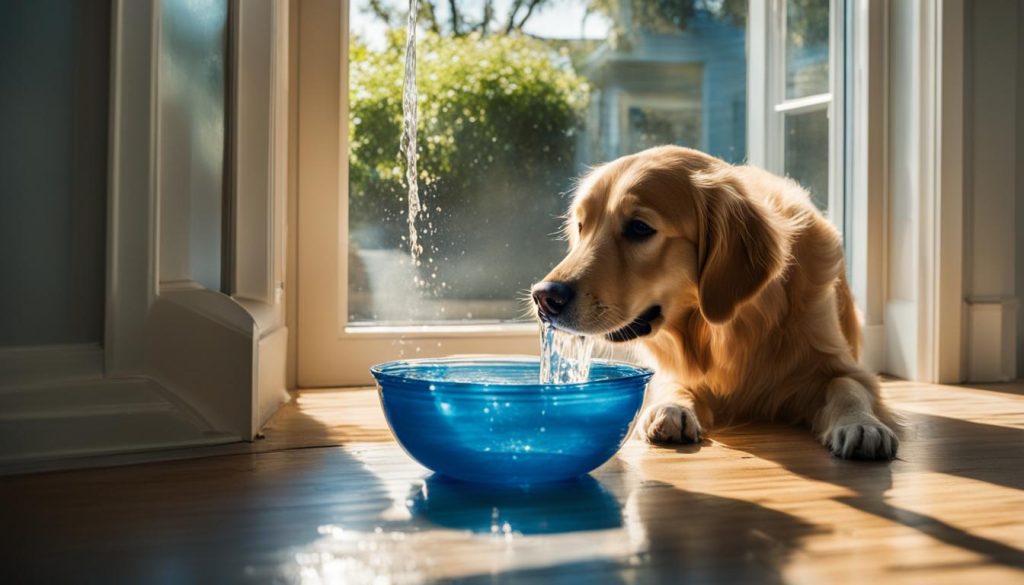
When it comes to keeping our dogs properly hydrated, there are a few important considerations to keep in mind. First and foremost, providing access to clean and fresh water at all times is crucial. Dogs, just like humans, need a constant supply of water to stay hydrated and maintain their overall health.
Monitoring your dog’s water intake is equally important. Pay attention to how much water your dog is drinking on a daily basis. If you notice a significant decrease in their water consumption or any changes in their behavior or appearance that may indicate dehydration, consult with a veterinarian for guidance.
It’s also essential to consider your dog’s activity level and the environmental conditions they are exposed to. Dogs who are more active or spend a lot of time outdoors in hot weather will likely require more water to stay hydrated. Pay attention to signs of overheating, such as excessive panting or lethargy, and provide extra water as needed.
Proper hydration is key to your dog’s overall well-being and can help prevent serious health issues. Always prioritize their access to fresh water and consult with a veterinarian if you have any concerns about their hydration needs.
Table: Signs of Dehydration in Dogs
| Signs of Dehydration | Description |
|---|---|
| Dry gums | Gums that appear sticky or dry to the touch |
| Sunken eyes | Eyes that appear sunken or lack moisture |
| Lethargy | Unusual lack of energy or excessive tiredness |
| Loss of appetite | Decreased interest in food or refusal to eat |
| Decreased skin elasticity | Skin that does not bounce back when gently pinched |
By understanding these important considerations for dog hydration, you can ensure that your furry friend stays happy, healthy, and properly hydrated. Remember to always provide fresh water, monitor their water intake, and adjust their hydration needs based on their activity level and the environment they are in. Your veterinarian is the best resource for personalized advice and guidance on keeping your dog hydrated and maintaining their electrolyte balance.
Signs of Dehydration in Dogs
Recognizing the signs of dehydration in dogs is crucial for ensuring their well-being. Dehydration occurs when there is an inadequate amount of water in the body, and it can lead to serious health issues if left untreated. As a responsible pet owner, it’s important to be aware of the signs of dehydration in dogs so you can take prompt action and seek veterinary care if necessary.
“Dry gums, sunken eyes, lethargy, loss of appetite, and decreased skin elasticity are some common signs of dehydration in dogs.”
One of the key indicators of dehydration in dogs is dry gums. Healthy dogs typically have moist and pink gums, so if you notice that your dog’s gums appear dry or sticky, it could be a sign of dehydration. Sunken eyes are another red flag to watch out for. Dehydration can cause the eyes to appear dull and sunken, indicating a lack of proper hydration.
Lethargy and loss of appetite are also common signs of dehydration in dogs. When a dog is dehydrated, they may become unusually tired and sluggish. Additionally, they may show a decreased interest in food and water. Another sign to look out for is decreased skin elasticity. You can perform a simple test by gently pinching a fold of skin on your dog’s neck or back. If the skin snaps back into place slowly or remains pinched, it may indicate dehydration.
Table: Signs of Dehydration in Dogs
| Signs of Dehydration | Description |
|---|---|
| Dry gums | Gums appear dry or sticky instead of moist and pink |
| Sunken eyes | Eyes appear dull and sunken |
| Lethargy | Unusual tiredness and lack of energy |
| Loss of appetite | Decreased interest in food and water |
| Decreased skin elasticity | Skin takes longer to snap back into place when gently pinched |
If you observe any of these signs of dehydration in your dog, it’s essential to take immediate action. Offer your dog fresh water and encourage them to drink. If they refuse to drink or show no improvement, it’s advisable to contact your veterinarian for further guidance. Prompt intervention is crucial to prevent dehydration from escalating and causing more serious health complications. Remember, ensuring safe hydration for your dog is a key responsibility as a pet owner.
Hydration Tips for Dogs
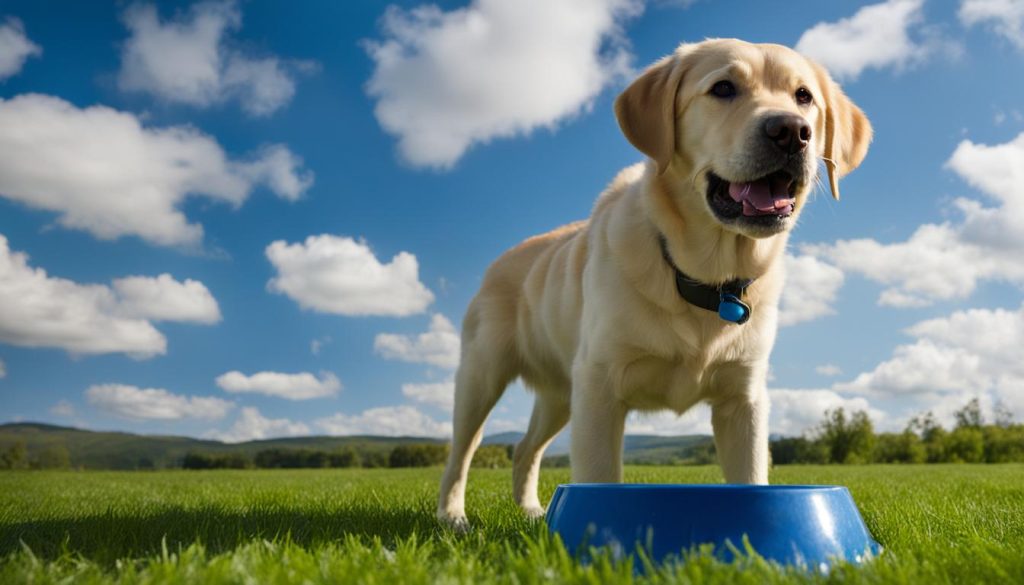
Proper hydration is essential for maintaining your dog’s overall health and well-being. Here are some important tips to help ensure your furry friend stays hydrated:
1. Provide fresh water: Always make sure your dog has access to clean and fresh water. Keep their water bowl filled throughout the day, especially during hot weather or after physical activity. Consider using a pet water fountain to encourage drinking.
2. Offer hydrating treats: Frozen treats or ice cubes can be a fun and refreshing way to keep your dog hydrated. Use dog-friendly ingredients, such as low-sodium broth, to make frozen treats that your pup will love.
3. Monitor water intake: Pay attention to how much water your dog is drinking. Dogs have different hydration needs based on their size, activity level, and the weather. If you notice your dog drinking excessively or hardly drinking at all, it may be a sign of an underlying health issue. Consult with a veterinarian for guidance.
4. Consider electrolyte replenishment: In certain circumstances, such as intense exercise or prolonged heat exposure, your dog may benefit from electrolyte replenishment. Look for specially formulated dog-friendly sports drinks that provide electrolytes without the harmful ingredients found in Gatorade.
5. Be mindful of activity levels: Dogs that are more active will naturally require more water to stay hydrated. If you’re planning a long walk or a day at the beach, make sure to bring plenty of water for your dog to drink along the way.
6. Consult with a veterinarian: If you have any concerns about your dog’s hydration or if you’re unsure about the best hydration practices for your specific dog, consult with a veterinarian. They can provide personalized advice based on your dog’s age, breed, and health status.
By following these hydration tips and being attentive to your dog’s water intake, you can ensure that your furry companion stays hydrated and healthy.
Consulting a Veterinarian for Guidance
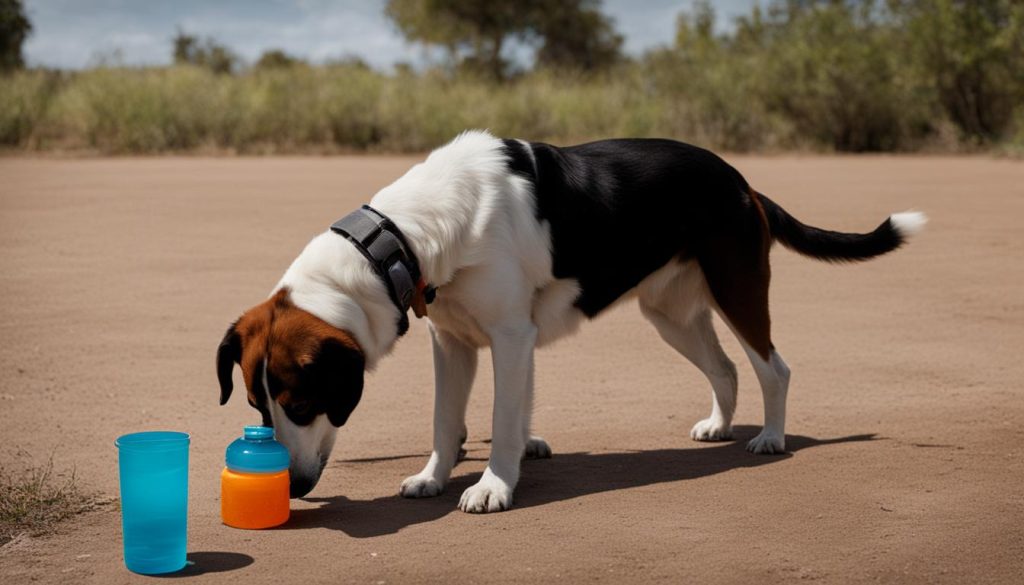
When it comes to ensuring the proper hydration of your beloved furry companion, consulting a veterinarian is always a wise choice. Veterinarians possess the knowledge and expertise to provide personalized guidance based on your dog’s specific needs. Whether you have concerns about your dog’s hydration levels, electrolyte balance, or the safety of certain hydration products, a veterinarian can offer valuable advice.
By seeking professional guidance, you can address any uncertainties and ensure you are meeting your dog’s hydration requirements effectively. Veterinarians can assess your dog’s age, breed, health status, and lifestyle to provide tailored recommendations. They can recommend safe hydration alternatives and educate you on the potential risks associated with certain products. With their expertise, you can make informed decisions to safeguard your dog’s health and well-being.
“Consulting a veterinarian is essential for pet owners who want to provide the best possible hydration for their dogs. Veterinarians have the necessary knowledge and experience to assess your dog’s individual needs and offer guidance on safe and effective hydration strategies.”
Additionally, a veterinarian can help you monitor your dog’s hydration status and identify any signs of dehydration or electrolyte imbalance. They can teach you how to recognize the subtle symptoms and take prompt action to rehydrate your dog if necessary. Regular check-ups with a veterinarian can also ensure that your dog’s overall health and hydration needs are assessed and managed effectively.
Benefits of Consulting a Veterinarian
- Expert guidance based on your dog’s specific needs
- Personalized recommendations for safe hydration alternatives
- Identification and management of dehydration or electrolyte imbalance
- Regular check-ups to monitor your dog’s overall health and hydration
| Benefits of Consulting a Veterinarian |
|---|
| Expert guidance based on your dog’s specific needs |
| Personalized recommendations for safe hydration alternatives |
| Identification and management of dehydration or electrolyte imbalance |
| Regular check-ups to monitor your dog’s overall health and hydration |
Overall, consulting a veterinarian is crucial for pet owners who want to provide the best possible hydration for their dogs. With their expertise and guidance, you can ensure that your dog’s hydration needs are met safely and effectively.
The Bottom Line: Can Dogs Drink Gatorade?
Gatorade, a popular sports drink for humans, may seem like a tempting option to offer your furry companion for hydration. However, it is important to understand the potential harmful effects and consider safer alternatives for your dog’s well-being. While dogs can technically drink Gatorade, it is not recommended due to its high sugar content, artificial additives, and excessive sodium levels.
One of the primary concerns with Gatorade is its high sugar content. Dogs have different metabolic processes than humans, and too much sugar can lead to weight gain, obesity, and even diabetes in dogs. Additionally, the artificial additives in Gatorade can be difficult for dogs to digest and may cause digestive upset.
Furthermore, the high sodium content in Gatorade can disrupt a dog’s electrolyte balance and contribute to dehydration. Excessive sodium intake can increase thirst and lead to increased water intake, which may result in frequent urination and potential kidney issues.
“Giving Gatorade to dogs can pose risks due to its high sugar, artificial additives, and excessive sodium levels.”
Instead of offering Gatorade to your dog, it is recommended to provide them with fresh, clean water at all times. Water is the most natural and essential source of hydration for dogs. Additionally, there are specially formulated dog-friendly sports drinks available on the market that offer electrolyte replenishment without the harmful ingredients found in Gatorade.
Consulting with a veterinarian is always a prudent choice when it comes to your dog’s hydration needs. They can provide personalized guidance based on your dog’s specific requirements and help you choose the most suitable hydration options. Remember, prioritizing your dog’s hydration is vital for their overall health and well-being.
| Gatorade | Fresh Water | Dog-friendly Sports Drinks |
|---|---|---|
| High sugar content | Natural and free from additives | Electrolyte replenishment without harmful ingredients |
| Artificial additives | Readily available and easily accessible | Specially formulated for canine hydration |
| Excessive sodium levels | Essential for hydration and body functions | Recommended by veterinarians |
Taking Care of Your Dog’s Hydration Needs
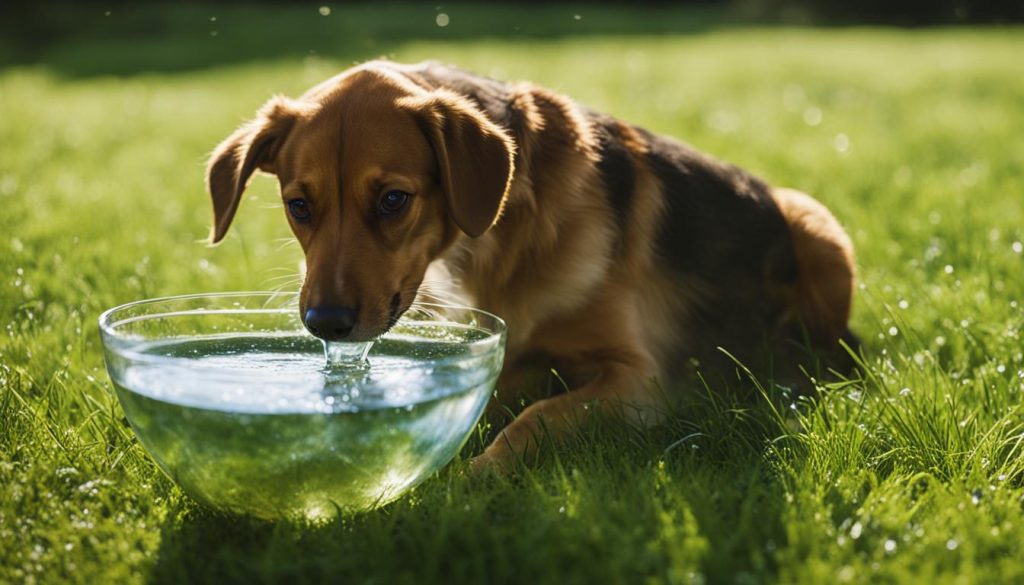
Proper hydration is essential for the overall health and well-being of our canine companions. As responsible pet owners, it is our duty to ensure that our dogs stay properly hydrated. By understanding the importance of hydration, recognizing signs of dehydration, and providing safe hydration alternatives, we can take care of our dog’s hydration needs effectively.
One important consideration for dog hydration is the availability of clean and fresh water at all times. Dogs should have access to water throughout the day, especially during hot weather or periods of physical activity. Consider using a pet water fountain to encourage drinking and ensure a steady supply of water for your furry friend.
Monitoring your dog’s hydration levels and intake is also crucial. Keep an eye on their water bowl and refill it as needed. If you notice a decrease in their water consumption or any signs of dehydration such as dry gums or lethargy, take action immediately. Rehydrate your dog using fresh water or dog-friendly hydration options, and consult with a veterinarian if the symptoms persist or worsen.
Additionally, be mindful of your dog’s activity level and environmental conditions. Dogs who are more active or spend time outdoors may require increased hydration. Provide them with opportunities to drink water during exercise or play sessions, and consider offering frozen treats or ice cubes made from safe ingredients to help them stay hydrated and cool.
The Importance of Regular Veterinary Consultation
“Consulting with a veterinarian is crucial for personalized guidance on meeting your dog’s specific hydration needs.”
When it comes to ensuring optimal hydration for your dog, it is always recommended to consult with a veterinarian. They can provide valuable advice and recommendations based on your dog’s age, breed, health status, and specific hydration requirements. A veterinarian can also help you address any concerns or questions you may have about maintaining your dog’s electrolyte balance and overall well-being.
Remember, providing proper hydration for your dog is an important aspect of responsible pet ownership. By prioritizing their hydration needs, monitoring their water intake, and seeking professional guidance when necessary, you can help promote your dog’s health and ensure they lead a happy and hydrated life.
| Signs of Dehydration in Dogs | Hydration Tips for Dogs |
|---|---|
|
|
Wrapping Up
To summarize, it is not recommended to give Gatorade to dogs due to its potential harmful effects. While humans rely on Gatorade to replenish electrolytes during physical activity or dehydration, it contains ingredients that may not be suitable for dogs. The high sugar content, artificial additives, and excess sodium in Gatorade can disrupt a dog’s electrolyte balance and lead to health problems. Therefore, it’s important to prioritize safe hydration alternatives for dogs.
Proper hydration is crucial for dogs to maintain their overall health and well-being. Just like humans, dogs rely on water for regulating body temperature, aiding digestion, and supporting cellular functions. Providing fresh water to dogs throughout the day is essential, especially during hot weather or physical activity. Additionally, dog-friendly hydration options, such as specially formulated sports drinks or frozen treats made from low-sodium broth, can help meet their hydration needs without the risks associated with Gatorade.
It’s important for pet owners to monitor their dog’s hydration levels regularly and be mindful of signs of dehydration, including dry gums, sunken eyes, lethargy, loss of appetite, and decreased skin elasticity. If any of these symptoms occur, taking immediate action to rehydrate the dog and seeking veterinary care if necessary is crucial. By consulting with a veterinarian, pet owners can obtain personalized guidance on maintaining their dog’s electrolyte balance and overall well-being.
To prioritize your dog’s hydration needs, remember to provide clean and fresh water at all times, consider dog-friendly hydration alternatives, and consult with a veterinarian whenever you have concerns or questions. By taking these steps, you can help ensure that your dog stays properly hydrated and promote their overall health and well-being.
FAQ
Can dogs safely consume Gatorade?
No, it is not recommended to give Gatorade to dogs due to its potential harmful effects.
What are the potential risks of giving Gatorade to dogs?
Gatorade contains high levels of sugar, sodium, and artificial additives that can disrupt a dog’s electrolyte balance and lead to health problems.
What are safe hydration alternatives for dogs?
Dog-friendly alternatives to Gatorade include plain water and specially formulated dog-friendly sports drinks available on the market.
What are the signs of dehydration in dogs?
Signs of dehydration in dogs include dry gums, sunken eyes, lethargy, loss of appetite, and decreased skin elasticity.
What are some hydration tips for dogs?
Provide clean and fresh water at all times, especially during hot weather or physical activity. Consider using a pet water fountain and offer frozen treats or ice cubes made from dog-friendly ingredients to keep your dog hydrated and entertained.
Should I consult with a veterinarian for dog hydration?
Yes, consulting with a veterinarian is recommended for personalized advice and guidance on meeting your dog’s specific hydration needs.
Can dogs drink Gatorade in moderation?
While dogs can technically consume Gatorade, it is still not recommended due to its potential harmful effects.
How can I ensure my dog stays hydrated?
Ensure your dog has access to clean and fresh water at all times, monitor their water intake, adjust hydration based on activity level and environmental conditions, and consult with a veterinarian if you have any concerns.
What is the bottom line regarding dogs and Gatorade?
Dogs should not be given Gatorade due to its potential harmful effects. It is best to provide fresh water and consider dog-friendly hydration alternatives.
How can I take care of my dog’s hydration needs?
Prioritize your dog’s hydration by providing fresh water, monitoring their water intake, and considering safe alternatives specifically formulated for canine hydration.


